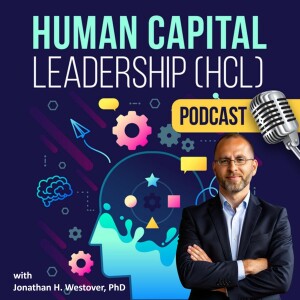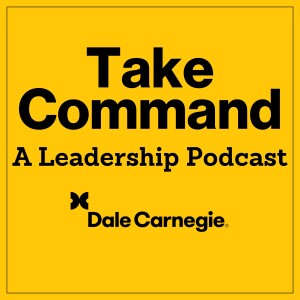

How to Succeed Podcast
https://howtosucceed.libsyn.com/rssEpisode List

How To Succeed at Transforming Your Life
Podcast Summary Carlos Garrido took a leap of faith in 2009, leaving behind the bustling world of finance in England to embrace the vibrant opportunities of Miami, Florida. His journey wasn't just about navigating new landscapes but also about mastering a language and culture that were foreign at first. Encouraged by his brother, Carlos transitioned into entrepreneurship, carrying with him the Sandler principles that had already begun to shape his perspective on personal and professional success. His story illuminates the profound impact of perseverance and connection, emphasizing how these tools helped him overcome the daunting challenges of starting anew. The definition of success is ever-evolving, and today more than ever, it transcends mere financial gain. We explore how iconic figures like Jeff Bezos and Mark Zuckerberg reflect a modern ethos that prioritizes health and time freedom over ostentatious wealth. Carlos shares his enlightening experience with the 75 Hard program, a grueling yet transformative regimen that reshaped his approach to mental toughness and personal growth. This personal narrative highlights the shift from external validation to intrinsic self-worth, encouraging listeners to question deeply ingrained beliefs about success and identity. The episode rounds out with a discussion on achieving a balanced life, where both health and business aspirations find harmony. Through holistic practices such as Stoicism, journaling, and meditation, Carlos has redefined his views on masculinity and success. The integration of new fitness techniques and dietary changes, shared with family members, serves as a testament to the power of personal transformation. Amidst life's inevitable setbacks, the commitment to ongoing development remains unwavering, painting a picture of a life where professional achievements and personal well-being coexist, driving toward a future of holistic success and fulfillment. (00:02) Journey to Success Through Sandler Principles (16:43) The Mental Toughness of Success (21:06) Transformation Through Fitness and Business (37:08) Balancing Health and Business Success (00:02) Journey to Success Through Sandler Principles This chapter features a conversation with Carlos Garrido, a Sandler trainer from Miami, Florida, who shares his personal and professional journey. Originally from Manchester, England, Carlos discusses his multicultural background with a Greek mother and a Spanish father, and his initial career in finance and investment banking. He explains how he relocated to Miami in 2009 to lead business development and M&A activities in Latin America, a move that was prompted by the global emphasis on BRICS strategies. Despite not speaking Spanish initially, Carlos embraced the challenge and fell in love with Miami and the United States, eventually becoming an American citizen. He recounts how he transitioned from finance to starting his own business in Miami, with encouragement from his brother who was a Sandler client. The chapter highlights the importance of perseverance and connection in overcoming the initial challenges of entrepreneurship. (16:43) The Mental Toughness of Success This chapter explores the evolving notion of what signifies success and wealth, contrasting the 1980s' flashy displays with today's emphasis on physical health and time freedom. We examine how modern entrepreneurs prioritize fitness, highlighting billionaires like Jeff Bezos and Mark Zuckerberg as examples of this shift. The conversation then transitions into a personal narrative about discovering and undertaking the 75 Hard program, a regimen aimed at mental toughness that also results in improved health. Initially resistant, I recount how repeated encounters with the program's concept, through friends and YouTube videos featuring its creator Andy Frazella, led to a transformative mindset shift. This experience underscores the importance of discipline, time management, and mental resilience in achieving personal growth. (21:06) Transformation Through Fitness and Business This chapter examines the journey of committing to a demanding 75-day program that requires daily dedication and challenges one's personal beliefs and identity. We explore how embarking on this journey required reevaluating what success means, questioning ingrained beliefs about roles as a man, father, and husband, and prioritizing personal health over economic achievements. Through self-reflection, the importance of self-concept in achieving success, especially in business and sales, is highlighted, emphasizing that one's self-worth is not solely tied to financial accomplishments. The transformative process includes overcoming cynicism and shifting the focus from external validation to an intrinsic sense of self-worth and personal value. This narrative illustrates the profound impact of challenging and reshaping one's identity and beliefs on personal growth and fulfillment. (37:08) Balancing Health and Business Success This chapter explores the journey of personal and professional growth, focusing on the transformation in mindset and lifestyle. We discuss the importance of integrating holistic practices like journaling, meditation, and philosophical exploration, particularly with Stoicism, to reshape perspectives on success and masculinity. Emphasizing the value of physical health, the narrative highlights adopting new fitness techniques and dietary habits, supported by resources like Men's Health and YouTube tutorials. We reflect on the continuous ambition for business growth, noting the significant progress made and future aspirations. The journey is one of balancing professional achievements with personal health and family life, sharing the challenges and rewards of weight loss and strength training, particularly in partnership with family members. Despite setbacks, the commitment to ongoing development remains steadfast, aiming for holistic success and well-being.

How To Succeed at Shifting Your Sales Performance Into High Gear
Podcast Summary Jennifer Cobb, the trailblazing NASCAR driver and entrepreneur, takes the wheel in our latest episode to share her extraordinary journey through the fast lanes of racing and business. Join us as Jennifer recounts her impressive achievements, like her standout sixth-place finish at Daytona, and navigates the challenges of a male-dominated sport without the cushion of major financial sponsorships. She opens up about the pivotal role her family, particularly her late mother, had in her career, and how she managed to balance racing with life's practicalities, such as securing health insurance and buying a home. Now, Jennifer channels her unstoppable drive into a new role at Fastener Supply Company, where her story continues to inspire. Listeners will discover the profound parallels between the relentless world of racing and the high-stakes field of sales. From overcoming initial fear and intimidation to developing an entrepreneurial mindset, Jennifer and I exchange personal stories about the transformative journey towards confidence and the establishment of equal business stature. We discuss the critical importance of understanding one's purpose and the essential support of a dedicated team, illustrating how these elements are key to thriving in both racing and business landscapes. The lessons learned on the racetrack translate seamlessly into the business world, offering invaluable insights for anyone striving to achieve their goals. Our conversation goes beyond the track and the sales floor to delve into the art of authenticity and resilience. Jennifer shares her experiences as a college student balancing academics, cheerleading, and a part-time job, all while pursuing her passion for racing. We talk about the discipline required to maintain routines and handle multiple responsibilities, highlighting how these skills are vital for success in any field. Through stories of embracing failure, navigating setbacks, and the humor found in unexpected moments—like setting a microwave on fire during a sales demo—Jennifer's journey is a testament to perseverance and the power of embracing life's learning opportunities. (00:03) Female NASCAR Pioneer's Longevity and Perseverance (09:18) Entrepreneurial Mindset for Success (16:45) Authenticity and Tenacity in Success (23:33) Entrepreneurial Mentoring and Female Racing (31:55) Learning From Failure in Sales (00:03) Female NASCAR Pioneer's Longevity and Perseverance This chapter features a conversation with Jennifer Cobb, a trailblazer in the NASCAR world as a part-time professional race car driver, team owner, and entrepreneur. We explore her impressive journey, highlighting her achievements as a female driver with notable records in the NASCAR Truck Series, including her sixth-place finish at Daytona, which was recently surpassed by Natalie Decker. Jennifer shares her experiences and challenges in a male-dominated sport, emphasizing her perseverance and longevity without the backing of significant financial sponsors. She also reflects on the support from her family, especially her late mother, and how she managed to balance racing with personal responsibilities like securing health insurance and purchasing a home. Jennifer now channels her determination into her role at Fastener Supply Company, resonating with others who have shown grit in their careers. (09:18) Entrepreneurial Mindset for Success This chapter explores the transformative journey from fear to confidence in the realm of sales, drawing parallels with the racing world. I share my initial trepidation with cold calling and the intimidating presence of gatekeepers, especially in the manufacturing sector, and how adopting a mindset of equal business stature became crucial. By shifting from a need-based approach to recognizing the value I bring, both in sales and racing sponsorships, I highlight the importance of confidence and team support. Additionally, I reflect on the significance of understanding one's 'why' in both racing and sales, emphasizing the passion and commitment to not only personal goals but also the responsibility towards a team. The chapter underscores the lessons learned from racing that translate into my business career, particularly the drive that comes from a clear purpose and the support of a dedicated team. (16:45) Authenticity and Tenacity in Success This chapter explores the journey of perseverance and determination, highlighting the experiences of a college student juggling academics, cheerleading, and a part-time job while pursuing a passion for race car driving. I share how my no-nonsense father instilled a strong work ethic, refusing to let me quit during challenging times. Reflecting on pivotal moments, such as entering Daytona for the first time, I discuss how these experiences shaped my mindset to never give up during tough times. The importance of consistent behavior and having a clear 'why' is emphasized, drawing parallels to the discipline required in sales. We explore how maintaining routines and balancing multiple responsibilities are crucial for success, and how these lessons apply to both racing and life. (23:33) Entrepreneurial Mentoring and Female Racing This chapter explores the journey of balancing spontaneity with productivity, highlighting how personal tricks can aid in achieving goals despite a lack of strict discipline. I share anecdotes from my entrepreneurial experiences, from starting with Avon at 18 to eventually selling fasteners in the racing industry. Emphasizing the importance of passion, consistency, and persistence, I recount humorous and challenging moments, such as accidentally setting a microwave on fire during a sales demo. Additionally, I touch on my approach to mentoring and public speaking, where I share my story to inspire others and offer guidance to those interested in sales or racing. (31:55) Learning From Failure in Sales This chapter explores the resilience and learning mindset required to overcome failures, both in high-speed racing and in sales. We discuss the importance of understanding why failures occur, emphasizing that analyzing and fixing issues is crucial for growth and success. By comparing experiences in racing and professional life, we highlight how setbacks provide valuable learning opportunities and can lead to improved performance and stronger outcomes. We also reflect on how acknowledging and taking responsibility for mistakes can foster trust and cooperation among peers. Finally, we touch on the qualities necessary for transitioning into new professions, especially in sales, and the significance of embracing failure as a natural and beneficial part of the journey.

How To Succeed at the Cure For Stupidity: Understanding the Brain Science of Change, Communication, and Human Behavior
Podcast Summary Eric Bailey, president of Bailey Strategic Innovation Group and bestselling author of "The Cure for Stupidity," joins us to unravel the complexities of human behavior through the lens of brain science. Inspired by a spontaneous New Year's resolution, Eric's journey from various industries to authoring a transformative book is nothing short of fascinating. He brings to light how our perception can mislead us and the illusion of certainty that our brains create, urging us to engage in self-reflection and adapt our communication for better understanding. Explore the captivating concept of schadenfreude and its impact on both personal and professional life. We shed light on how this feeling of pleasure in others' misfortunes shows up in sports and workplace rivalries, and how it can affect team cohesion and organizational culture. The importance of acknowledging non-verbal cues, or emotional "leakage," is emphasized to ensure teamwork and cultural integrity aren't compromised. Eric and I delve into the role culture plays in achieving collective success, stressing that it's not just about top-down mandates but about the attitudes and behaviors of everyone involved. Effective communication and leadership are the pillars of a successful workplace culture, and this episode dives deep into these essentials. From the pitfalls of uncommunicated expectations to the virtues of "radical curiosity," we highlight how leaders can transform their interactions from transactional to relational, fostering genuine connections with their teams. Emphasizing the importance of managing individuals and embracing generational shifts in communication, we advocate for environments where genuine emotional experiences are valued, ultimately enhancing leadership effectiveness and employee retention. (00:01) The Cure for Stupidity (12:51) The Impact of Culture on Success (17:06) Building and Nurturing Workplace Culture (29:43) Effective Leadership Communication and Training (36:13) Mastering Curiosity and Communication in Leadership (00:01) The Cure for Stupidity This chapter features an engaging conversation with Eric Bailey, the president of Bailey Strategic Innovation Group and author of the bestselling book, "The Cure for Stupidity: Using Brain Science to Explain Irrational Behavior." We explore Eric's journey from various industries to becoming an author, sparked by a New Year's resolution during a family road trip. Eric shares insights from his book, which is grounded in brain science principles, covering topics such as our tendency to believe our perception of the world is reality and the illusion of certainty. These concepts highlight how our brains can lead us to mistakenly assume we are correct in our interactions with others. Eric emphasizes the importance of self-reflection and adapting our communication to improve understanding, as exemplified by host David's personal anecdotes about learning to distinguish between opinion and fact in his communication. (12:51) The Impact of Culture on Success This chapter explores the intriguing concept of schadenfreude, the pleasure derived from someone else's misfortune, and its implications in both personal and professional settings. We discuss how this phenomenon can manifest in sports rivalries and workplace dynamics, particularly in competitive situations like vying for promotions. The conversation highlights the importance of recognizing these feelings and shifting focus towards collective success, emphasizing the role of team cohesion and cultural alignment in organizations. We consider the challenges faced in team environments, such as sales, where internal dissonance can affect client perceptions and outcomes. The chapter also touches on the non-verbal cues, or "leakage," that reveal our true emotions, potentially undermining teamwork and organizational culture. Finally, I reflect on the pivotal role of culture in fostering successful collaborations and achieving shared goals within companies. (17:06) Building and Nurturing Workplace Culture This chapter focuses on the essence and influence of culture within organizations, emphasizing that culture is defined by the attitudes, beliefs, and behaviors of its people, not merely dictated from the top. I explore how nurturing desired cultural traits, like communication and accountability, requires active participation and feedback from everyone involved. Addressing generational perceptions, I highlight how every generation tends to label the next as self-absorbed, referencing historical views dating back to Aristotle. We also discuss the impact of technology on communication, particularly among younger generations, noting how reliance on digital expressions like emojis and abbreviations may lead to a diminished experience of genuine emotions. This shift could result in amplified emotional responses when real emotions are encountered. (29:43) Effective Leadership Communication and Training This chapter explores the critical importance of clear communication and setting expectations in leadership. We share a real-life example of a leader who struggled with an employee's tardiness due to vague instructions about start times. Highlighting the pitfalls of assuming common sense in workplace norms, we discuss how misunderstandings can arise from uncommunicated expectations, leading to potential conflicts. We emphasize the necessity for leaders to have uncomfortable conversations to ensure clarity and alignment within teams. Furthermore, we touch upon the shortcomings of performance reviews when expectations aren't clearly set and revisited. Lastly, we underline the need for proper training for leaders to equip them with the skills necessary to effectively manage and communicate with their teams. (36:13) Mastering Curiosity and Communication in Leadership This chapter explores the critical leadership skills necessary for success, focusing on the importance of teaching leaders how to communicate effectively, coach, lead, and handle difficult conversations. We emphasize the concept of "radical curiosity," which encourages leaders to adopt a mindset of learning from everyone they meet, regardless of their hierarchical position. By fostering curiosity and asking questions, leaders can create stronger connections with their teams and transform interactions from transactional to relational. The conversation highlights the significance of managing individuals rather than just teams and taking personal responsibility for employee retention. The chapter concludes with a call to catch ourselves when pretending to be know-it-alls, advocating for a shift toward learning and understanding to enhance leadership effectiveness.

How To Succeed at Being Unstoppable: Unlocking Your Full Potential in a Changing World
Renowned speaker and author Krish Dhanam shares his compelling journey from a Zig Ziglar seminar to transforming his career in sales. Experience firsthand the enlightening stories and personal anecdotes that reveal how stepping out of comfort zones can shape the mindset of the top 3% who thrive in the effective zone. Krish’s insights into mindset shifts and embracing change illuminate the path to achieving sales success and overcoming any obstacles in your way. Uncover the secrets to effective leadership and consistent success as we discuss the importance of consistent daily actions over sporadic efforts. Drawing inspiration from the Sandler sales approach and Zig Ziglar's teachings, we explore how establishing a structured plan and growth mindset within teams can lead to sustained achievements. Learn how to prioritize what you can influence and use motivation, consistency, and strategic planning to reach and surpass your goals. Discover the power of product conviction and peak performance as Krish highlights the impact of belief and confidence in sales and leadership. With personal anecdotes and wisdom from mentors, we discuss how instilling conviction in your team about the transformative potential of your products can drive excellence and peak performance. This episode is packed with actionable strategies and insights that will challenge you to recognize that true success starts from within. (00:03) Success Mindset and Overcoming Obstacles (14:17) Daily Behavioral Plan for Sales Success (26:12) Product Conviction and Peak Performance (31:49) Peak Performance and Sales Habits (43:33) Inner Conviction for Sales Success (00:03) Success Mindset and Overcoming Obstacles This chapter features an engaging conversation with Krish Dhanam, a seasoned speaker and author with a remarkable journey in the sales industry. We explore Krish's transformative experience attending a Zig Ziglar seminar, which marked a pivotal turning point in his career. Krish shares insights on the importance of stepping out of comfort zones, emphasizing the distinction between comfort zone thinkers and effective zone thinkers. He highlights the mindset of the 3% who operate in the effective zone, characterized by their proactive and innovative approach to challenges. We also discuss how individuals can identify where they stand and strategies to transition into becoming effective zone thinkers, focusing on mindset shifts and embracing change. (14:17) Daily Behavioral Plan for Sales Success This chapter focuses on the mindset required for effective leadership and consistent success. We explore how leaders can prioritize negotiable factors they can influence rather than getting bogged down by uncontrollable elements. The importance of consistent daily actions over sporadic efforts is emphasized, drawing on the Sandler sales approach and the insights of renowned motivational speaker Zig Ziglar. By implementing a structured, methodical plan and fostering a growth mindset within teams, leaders can achieve sustained success without relying on last-minute, frenzied activity. Additionally, we highlight the importance of establishing clear foundations, visions, and benchmarks to guide the growth process and ensure accountability. Through stories and personal experiences, the discussion underscores the power of motivation, consistency, and strategic planning in reaching and exceeding goals. (26:12) Product Conviction and Peak Performance This chapter explores the fluidity of the PEST model in management, emphasizing the importance of belief and conviction in leadership and sales. I discuss how having absolute confidence in a product or service can be as comforting as a doctor assuring a patient with experience and certainty. The conversation highlights how this conviction impacts clients and the significance of preparation and effort, regardless of past successes. Reflecting on personal experiences and teachings from mentors like Mr. Ziegler, I stress the importance of honoring one's profession and consistently striving for excellence. Furthermore, we examine the idea that the true essence of replicating success within a company lies in instilling conviction in the team about the transformative power of their products or services. By nurturing this belief, organizations can achieve peak performance and significantly enhance their impact. (31:49) Peak Performance and Sales Habits This chapter explores the nuances of sales management and personal productivity, emphasizing the importance of recognizing one's strengths and finding complementary partners in the workplace. We discuss the concept of being a creator who generates ideas and the necessity of having a trusted executor to bring those ideas to fruition. The conversation highlights the importance of viewing oneself as part of an assembly line where everyone's output serves as someone else's input, promoting efficiency and teamwork. We also reflect on the difference between individuals who work for a paycheck versus those driven by a mission to make a difference. A personal anecdote underscores the lasting impact of genuine passion and excellence, while Stanley Marcus's wisdom about sales is quoted to reinforce the value of client relationships. The chapter concludes with advice on maintaining peak performance through non-negotiable daily disciplines and the importance of being a time miser to eliminate frivolity and focus on meaningful interactions and tasks. (43:33) Inner Conviction for Sales Success This chapter challenges us to rethink our approach to success by focusing on the mindset and conviction we bring to our daily lives. Instead of searching for external tactics, Krish Dhanam encourages us to recognize that true success lies within us and is influenced by our thoughts and actions. It's a reminder that while tactical strategies are important, the foundation of success is built on our internal mindset and how we engage with our goals. As we reflect on this, the chapter leaves us with the powerful insight that success is as much about our internal perspective as it is about external actions. Until next time, keep this mindset in focus for good selling.

How To Succeed at Creating Engagement with Corporate Events
Nashville's own Benji Harris, a gifted songwriter and composer, joins us to unravel the profound influence of music on the corporate world. From his early days forming a band in middle school to sharing stages with country stars, Benji has skillfully woven his experiences into his work with Song Division—pioneering a unique approach to employee engagement and company culture through music. Prepare to be captivated by his journey and insights on using music to transform attitudes and behaviors within corporate environments. Explore the power of musical team-building exercises where skepticism morphs into enthusiasm and teamwork. Benji sheds light on the science behind these experiences, from the release of dopamine and oxytocin, to the tangible shift in mood and collaboration among team members. He emphasizes the fun factor with engaging elements like costumes and props, which break down barriers and foster genuine connections. This approach not only reinforces core values but also creates a memorable shared experience that lingers long after the event. Our conversation goes beyond music to reveal how Sandler training techniques can revolutionize communication, both in sales and personal interactions. We touch on the concept of "planned spontaneity," where preparation meets intuition for a seamless presentation style. Whether you're aiming to boost team cohesion or enhance your leadership skills, the insights shared in this episode offer a fresh perspective on nurturing a cohesive work environment. Tune in to discover how music and communication strategies can lead to meaningful professional and personal growth. (00:02) Music in Corporate Culture (11:31) Musical Team Building Experiences (20:07) The Power of Musical Team Building (33:27) Effective Communication Techniques in Sales (46:03) Podcast Promotion and Copyright Protection (00:02) Music in Corporate Culture This chapter welcomes Nashville-based songwriter, composer, and educator Benji Harris, who shares his journey from discovering the emotional power of music as a child to becoming a professional musician. We explore Benji's path, from forming his first band in middle school to performing with country stars and eventually finding his place in Nashville. The conversation shifts to his involvement with Song Division, a company that brings music into the corporate world to enhance employee engagement and company culture. Benji explains how Song Division uses music as a universal language to foster connection, bonding, and retention among teams through unique musical experiences at corporate events. The discussion touches on the synergy between music and corporate culture, highlighting how music can influence attitudes and behaviors, aligning with concepts like Sandler's success triangle of behavior, attitude, and technique. (11:31) Musical Team Building Experiences This chapter explores the transformative power of music in team-building activities within corporate environments. I discuss how music can effectively convey core values by not only highlighting their importance but also illustrating the consequences of not adhering to them. By engaging participants in a unique song-writing exercise, where initial skepticism and discomfort give way to excitement and camaraderie, teams experience a tangible shift in behavior and mindset. This process leverages the science of music to foster dopamine and oxytocin release, enhancing mood and bonding among team members. By providing fun elements like costumes and props, we encourage participants to embrace the experience fully, resulting in improved collaboration and lasting connections. (20:07) The Power of Musical Team Building This chapter explores the transformative power of music in building team cohesion and enhancing leadership development. We discuss the often-overlooked element of trust within new teams, emphasizing its critical role alongside technical aspects like roles and responsibilities. The chapter highlights a unique program that uses music as a tool to foster trust and understanding among team members, allowing them to connect on a deeper level by sharing personal motivations and values. Through songwriting, teams create a shared experience that breaks down workplace barriers, encouraging open communication and strengthening company culture. We reflect on the reactions of executives who witness the unexpected yet powerful impact of this approach, affirming the importance of innovative strategies in nurturing a positive and cohesive work environment. (33:27) Effective Communication Techniques in Sales This chapter explores the transformative impact of Sandler training on both professional and personal interactions. I discuss how the Sandler method has revolutionized my sales approach by providing a structured way to guide conversations with potential clients, emphasizing the importance of asking the right questions and allowing the client to do most of the talking. This methodology extends beyond the sales environment, influencing personal relationships and interactions. We also examine the concept of "planned spontaneity," where preparation and practice allow for a confident, flexible presentation style that appears spontaneous to the audience. Sharing experiences from being on stage, I highlight how self-deprecation and audience engagement create a relaxed atmosphere, making presentations more relatable and enjoyable. Through these strategies, the chapter underscores the value of preparation, intuition, and adaptability in effectively connecting with an audience. (46:03) Podcast Promotion and Copyright Protection This chapter is an introduction to the How to Succeed podcast featuring Benji Harris. I invite you to stay tuned for our upcoming episodes, which will be available for download on your favorite podcast platforms. Our goal is to provide valuable insights and strategies to help you succeed in your endeavors. I look forward to sharing more content with you soon, and until then, I wish you good selling.
Create Your Podcast In Minutes
- Full-featured podcast site
- Unlimited storage and bandwidth
- Comprehensive podcast stats
- Distribute to Apple Podcasts, Spotify, and more
- Make money with your podcast












